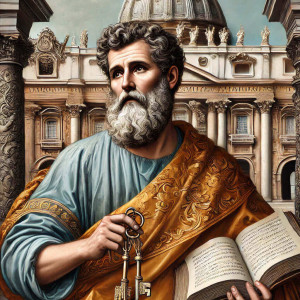The authority of the Pope, as the supreme leader of the Catholic Church, is founded both in Scripture and the Tradition of the Church. The concept of papal infallibility, as taught in the Catechism of the Catholic Church (CIC 891), states that the Pope is infallible when proclaiming doctrines of faith and morals "ex cathedra," meaning when he speaks in his official capacity as the supreme Pastor of the Church. This infallibility is a gift of the Holy Spirit that ensures that the Pope, in matters essential to salvation, does not err. Since the definition of the dogma of infallibility in 1870, at the First Vatican Council, "ex cathedra" infallibility has been exercised officially twice: in 1854, with the definition of the dogma of the Immaculate Conception of Mary, and in 1950, with the definition of the dogma of the Assumption of Mary.
The biblical basis for this authority traces back to the Gospel of Matthew (Mt 16:18), where Jesus declares to Peter: "You are Peter, and on this rock I will build my Church." This passage highlights Peter's unique role as the foundation of the Church. In John 21:15-17, Jesus entrusts Peter with the mission of tending his sheep, thus affirming his leadership over the Christian community.
At the Council of Jerusalem (Acts 15:7-11), Peter exercises this leadership by deciding that circumcision was not necessary for salvation, demonstrating his authority in teaching the faith. The Pope's authority is also supported by Tradition, as seen in the writings of Saint Ignatius of Antioch, who refers to the Church of Rome as "presiding in love," and Saint Irenaeus of Lyon, who affirms that, due to its "more excellent origin," it is necessary that "the whole Church, that is, the faithful from every place," agree with the Church of Rome, because in it "the tradition coming from the apostles has always been preserved."
Thus, the Pope's authority in matters of faith and morals, and his central role in the Church, is both biblically and traditionally founded, reinforced by the testimony of the early Church and the continuous exercise of this authority throughout the centuries.

The Authority of the Pope in the Catholic Church
The authority of the Pope as the supreme leader of the Catholic Church is founded in the Bible and Tradition. Papal infallibility, exercised "ex cathedra" in doctrines of faith and morals, is a gift of the Holy Spirit that ensures the preservation of truth in matters essential for salvation, as taught in the Catechism of the Catholic Church.
-
CIC 891
-
Mt 16:18
-
Jn 21:15-17
-
Jn 14:26
-
Mt 28:20
-
1 Tim 3:15
-
Jn 16:13
-
Acts 15:7-11
-
Ignatius of Antioch. Ignatius to the Romans. In: Apostolic Fathers: Clement of Rome, Ignatius of Antioch, Polycarp of Smyrna, The Shepherd of Hermas, Letter of Barnabas, Papias, Didache. Trans. by Ivo Storniolo, Euclides M. Balancin. São Paulo: Paulus, 1995. 10th Reprint: 2021. p. 103.
-
IRENAEUS OF LYON. Against Heresies. In: IRENAEUS OF LYON: Against Heresies – Book III Christian Doctrine. Trans. by Lourenço Costa. 1st ed. São Paulo: Paulus, 1995. 7th Reprint: 2021. pp. 249-251.
While every effort is made to ensure accuracy and conformity with the teachings of the Catholic Church, we acknowledge that errors in interpretation or presentation may occur. If you identify any answer or content that is not in line with the official teachings of the Church, we kindly ask you to inform us. We are committed to reviewing and promptly correcting any errors that are identified.
We understand that fidelity to the Church’s doctrine is fundamental, and for this reason, we value users' collaboration in maintaining the integrity of the content presented.
We thank you for your understanding and commitment to the Catholic faith.







